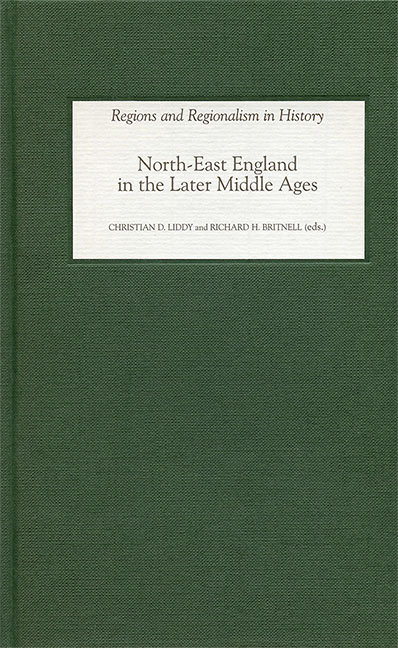Book contents
- Frontmatter
- Contents
- List of Illustrations
- Contributors
- Preface
- Abbreviations
- Introduction
- 1 St Cuthbert and the Border, c.1080–c.1300
- 2 John Hardyng, Northumbrian Identity and the Scots
- 3 Remembering the Legal Past: Anglo-Scottish Border Law and Practice in the Later Middle Ages
- 4 Scaling the Ladder: The Rise and Rise of the Grays of Heaton, c.1296–c.1415
- 5 Land, Legend and Gentility in the Palatinate of Durham: The Pollards of Pollard Hall
- 6 Local Law Courts in Late Medieval Durham
- 7 The Free Court of the Priors of Durham
- 8 Church Discipline in Late Medieval Durham City: The Prior as Archdeacon
- 9 Economy and Society in North-Eastern Market Towns: Darlington and Northallerton in the Later Middle Ages
- 10 Newcastle Trade and Durham Priory, 1460–1520
- 11 The Size and Shape of Durham’s Monastic Community, 1274–1539
- 12 Peasants, Landlords and Production between the Tyne and the Tees, 1349–1450
- 13 Wastes, the Margins and the Abandonment of Land: The Bishop of Durham’s Estate, 1350–1480
- 14 Framing Medieval Landscapes: Region and Place in County Durham
- Index
3 - Remembering the Legal Past: Anglo-Scottish Border Law and Practice in the Later Middle Ages
Published online by Cambridge University Press: 23 March 2023
- Frontmatter
- Contents
- List of Illustrations
- Contributors
- Preface
- Abbreviations
- Introduction
- 1 St Cuthbert and the Border, c.1080–c.1300
- 2 John Hardyng, Northumbrian Identity and the Scots
- 3 Remembering the Legal Past: Anglo-Scottish Border Law and Practice in the Later Middle Ages
- 4 Scaling the Ladder: The Rise and Rise of the Grays of Heaton, c.1296–c.1415
- 5 Land, Legend and Gentility in the Palatinate of Durham: The Pollards of Pollard Hall
- 6 Local Law Courts in Late Medieval Durham
- 7 The Free Court of the Priors of Durham
- 8 Church Discipline in Late Medieval Durham City: The Prior as Archdeacon
- 9 Economy and Society in North-Eastern Market Towns: Darlington and Northallerton in the Later Middle Ages
- 10 Newcastle Trade and Durham Priory, 1460–1520
- 11 The Size and Shape of Durham’s Monastic Community, 1274–1539
- 12 Peasants, Landlords and Production between the Tyne and the Tees, 1349–1450
- 13 Wastes, the Margins and the Abandonment of Land: The Bishop of Durham’s Estate, 1350–1480
- 14 Framing Medieval Landscapes: Region and Place in County Durham
- Index
Summary
In October 1371 Henry Percy, warden of the East March, wrote to the chancellor of England requesting the arrest and detention of Sir Hugh Dacre until the latter should find surety for the sum of £100 that Percy had paid to the Scottish earl of Douglas ‘to maintain the truce’. In his letter Percy noted that Dacre had been condemned by ‘a solemn assize of English and Scotsmen’, and that his unwillingness to pay the sum posed a threat to the current truce. In the end, Percy secured a judgment permitting him to levy £100 from Dacre's estates in Lincolnshire in repayment for the monies he had disbursed. The importance of this document lies not so much in its tenor – for by 1371 the Percies were already practised at petitioning the crown for the expenses they incurred as wardens – but rather in the information it provides about the existence of tribunals in the northern border lands and the means by which cross-border disputes were settled. The letter is, above all, valuable because it is one of a relatively small body of extant records relating to the workings of these courts, and of the unique resort, in the fourteenth century, to juries drawn from the English and Scottish allegiances. The use of mixed juries and, more generally, the existence of legal customs that called for the testimony of special juries, form the subject of this essay. It explores the use of these juries in the north and the jurors’ appeal to custom in the thirteenth and fourteenth centuries; it argues, moreover, that these men laid claim to a ‘custom’ that, ironically, was itself constantly in a process of change. The essay is also firmly based on the premise that the political concerns of the English crown profoundly influenced the northerners’ perceptions about border law and border custom.
For most of the thirteenth century relations between England and Scotland were cordial. There were occasional quarrels, especially with respect to the boundary between the realms. But for the most part these disputes were merely the stuff of diplomatic discussion, and the marriage in 1251 of King Alexander III with Margaret, the daughter of the English ruler Henry III, inaugurated ‘a long period of peace and very good relations between the kingdoms’.
- Type
- Chapter
- Information
- North-East England in the Later Middle Ages , pp. 43 - 56Publisher: Boydell & BrewerPrint publication year: 2005



